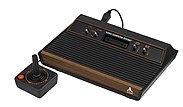The video game crash of 1983, known as Atari shock in Japan, was a massive recession of the video game industry that occurred from 1983 to 1985. Revenues had peaked at around $3.2 billion in 1983, then fell to around $100 million by 1985 (a drop of almost 97 percent). The crash was a serious event that brought an abrupt end to what is considered the second generation of console video gaming in North America.
The crash almost destroyed the then-booming industry and led to the bankruptcy of several companies producing home computers and video game consoles in the region, including the fastest-growing U.S. company in history at that point, Atari. It lasted about two years, and many business analysts of the time expressed doubts about the long-term viability of video game consoles. The North American video game console industry recovered a few years later, mostly due to the widespread success of the Nintendo Entertainment System (NES), which was soft launched in New York City in late 1985 and had become extremely popular in North America by 1987.
There were several reasons for the crash, but the main cause was saturation of the market. The full effects of the industry crash would not be felt until 1985. (Full article...)
